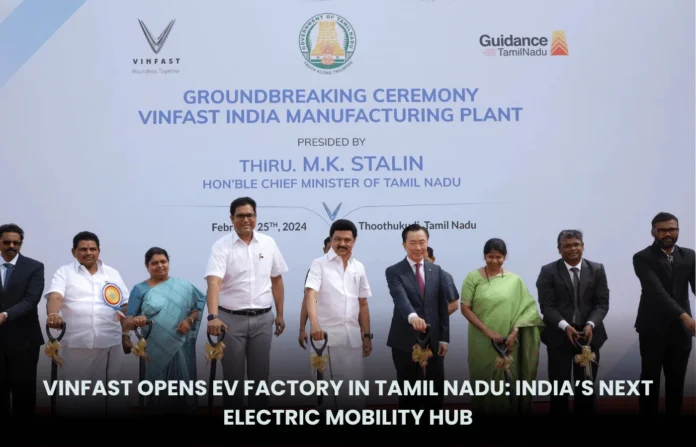VinFast Opens EV Factory in Tamil Nadu: Introduction
Vietnamese electric vehicle (EV) pioneer VinFast has officially launched its first manufacturing facility in India, marking a major milestone in both the company’s global expansion strategy and India’s transition towards green mobility. Spanning over 400 acres in the SIPCOT Industrial Park, Thoothukudi, the new facility is poised to become a key hub for sustainable automotive production in South Asia.
Phase-One Rollout: Electric SUVs and Capacity Plans
In the initial operational phase, the facility will focus on the production of electric SUVs, specifically the VF 6 and VF 7 models. With an initial annual production capacity of 50,000 vehicles, the plant is designed to scale operations up to 1.5 lakh units per year in the near future. This phased ramp-up aligns with VinFast’s global vision to deliver 2 lakh EVs worldwide by 2025, and ultimately reach an annual output of 10 lakh vehicles by 2030.
This growth-centric approach reflects the company’s responsiveness to India’s rapidly increasing appetite for eco-friendly transportation and its commitment to supporting national sustainability goals.
Commitment to Localization and Employment
VinFast’s Tamil Nadu plant is more than just a manufacturing hub—it represents a model of local integration and economic development. The factory will feature fully integrated production capabilities, including:
- Body and paint shops
- Automated assembly lines
- Advanced quality control systems
- Logistics and supply chain centers
- An auxiliary supplier ecosystem
At full capacity, the plant is projected to generate 3,000–3,500 direct jobs, alongside thousands of indirect employment opportunities within the regional supply chain. This aligns with India’s focus on self-reliance (Aatmanirbhar Bharat) and industrial skill enhancement.
Strategic Emphasis on Indigenous Sourcing
VinFast will give domestic sourcing and supplier relationships top priority in order to show its long-term dedication to the Indian market and support regional manufacturing ecosystems. The company also intends to invest in technology transfer and human resource development, ensuring knowledge exchange that contributes to India’s skill-based industrial growth.
This aligns seamlessly with national objectives such as “Make in India”, while promoting knowledge-led green transformation.
A Holistic EV Ecosystem for India
VinFast’s presence in India extends well beyond vehicle production. The business is working to create a complete EV ecosystem, which consists of:
- Sales and distribution networks
- After-sales support and service integration
- Battery recycling and circular economy initiatives
Key partnerships include collaborations with RoadGrid, myTVS, and Global Assure for end-to-end vehicle servicing, while BatX Energies will manage battery recovery and recycling processes, reinforcing VinFast’s environmental responsibility.
India as a Gateway to Emerging Markets
VinFast’s investment in India is also a strategic move to establish a robust export base targeting regions such as South Asia, the Middle East, and Africa. CEO of VinFast Asia, Pham Sanh Chau, emphasized during the factory’s inauguration:
“India is not just a destination for production; it is a launchpad for our expansion into emerging global markets. This facility stands as a testament to our long-term vision.”
With initial export orders already secured, the Tamil Nadu plant is set to become a crucial hub in VinFast’s global logistics and distribution network.
Final Thoughts: A Green Milestone in India’s Mobility Future
VinFast’s entry into India is a significant endorsement of the country’s potential as an EV manufacturing and innovation powerhouse. By combining cutting-edge technology, local collaboration, and sustainable practices, the company is setting a high benchmark for other EV manufacturers entering the Indian market.
As India gears up to become one of the largest EV markets globally, initiatives like VinFast’s plant in Tamil Nadu provide not only environmental value but also economic empowerment, cementing the country’s position on the global green mobility map.
Quick Summary for Readers
- Location: Thoothukudi, Tamil Nadu
- Initial Production: VF 6 and VF 7 electric SUVs
- Annual Output Goal: From 50,000 to 1.5 lakh units; 10 lakh globally by 2030
- Jobs Expected: 3,000–3,500 direct jobs
- Eco Goals: Battery recycling, local sourcing, sustainability
- Export Markets: South Asia, Middle East, Africa


